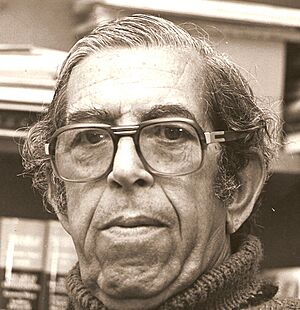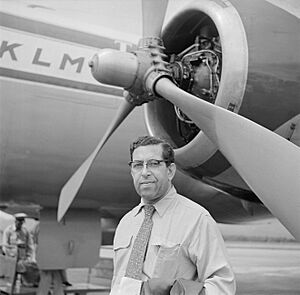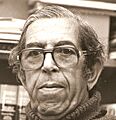Lou Lichtveld facts for kids
Quick facts for kids
Lou Lichtveld
|
|
|---|---|
 |
|
| Born |
Lodewijk Alphonsus Maria Lichtveld
7 November 1903 Paramaribo, Suriname
|
| Died | 10 July 1996 (aged 92) |
| Other names | Albert Helman |
| Occupation | Playwright, poet, organist, journalist, politician |
| Political party | National Party of Suriname |
| Children | Noni Lichtveld |
Lodewijk 'Lou' Lichtveld (born November 7, 1903 – died July 10, 1996) was an important person from Suriname. He was a politician, a writer of plays, a poet, and a brave resistance fighter. He often used the pen name "Albert Helman" for his writings.
He became well-known in 1923. This was when he published a book of poems called De glorende dag (which means The Dawning Day). This book was a big step for writers from other countries living in the Netherlands. Three years later, he published another important book, Zuid-Zuid-West (South-South-West).
In 1940, before the Netherlands was invaded, he wrote Millioenen-leed ("Millions of Suffering"). This book was about how Jewish people were treated in Nazi Germany. During World War II, he was part of a secret group called the "Great Council of Illegality." After the war, he helped govern the Netherlands in a special "Emergency Parliament." In 1949, he went back to Suriname. There, he became the Minister of Education and later the Minister of Health.
Contents
Biography of Lou Lichtveld
Lou Lichtveld was born in Paramaribo, Suriname. His family was well-known and respected. When he was twelve, he traveled to the Netherlands. He went to a boarding school called Rolduc to study to become a priest.
He didn't stay there for long. He soon returned to Suriname. At the Paulus School in Paramaribo, he studied music. After finishing his music studies, he worked as an organist and wrote music.
In 1922, he went back to the Netherlands. This time, he trained to be a teacher and continued his music studies. After he finished his education, he worked as an organist in Amsterdam. Later, he became a journalist, writing for newspapers.
His first book came out in 1923. It was a collection of poems called De glorende dag ("The Dawning Day"). He published this book under his real name, Lodewijk Lichtveld. He started using the pen name "Albert Helman" in 1926. This was for his first novel, Zuid-Zuid-West ("South-South-West"). This novel shared his memories of Suriname. It also talked about how the Dutch colonizers took advantage of his home country. The book ended with a strong message against colonialism. He wrote many more novels, essays, and poems after this.
He also wrote plays for the theater. He translated books from other languages into Dutch. His music was even used in a silent film called Rain (1929) by Joris Ivens. In 1932, a sound version of the film came out with music composed by Helman. In 1931, he wrote a play about the third journey of Willem Barentsz, a famous explorer.
Lou Lichtveld in Spain
In 1932, Lichtveld moved to Spain. There, he joined the fight in the Spanish Civil War. He fought alongside the Republicans. They were fighting against the fascists, led by General Francisco Franco.
He wrote articles about the civil war for newspapers like NRC Handelsblad and De Groene Amsterdammer. After Franco's side won, Lichtveld had to leave Spain. He fled to North Africa in 1938. From there, he went to Mexico, and finally returned to the Netherlands in 1939.
Lou Lichtveld and the Resistance
Back in the Netherlands, Lichtveld became very concerned about the Jewish people. Many had fled Germany to escape persecution. In 1940, he wrote the book Millioenen-leed ("Millions of Suffering"). He wrote it for a group called the "Committee for Special Jewish Interests."
After Germany invaded the Netherlands in May 1940, Lichtveld went into hiding. He was known for being against fascism, so he couldn't be seen in public. He joined the Dutch resistance. He helped by making fake personal documents for people. He also wrote secret messages and slogans for the resistance. He wrote for a hidden newspaper called Vrije Kunstenaar ("Free Artist").
During the German occupation, he used many different pen names. Some of these were Joost van den Vondel, Friedrich W. Nietzsche, Hypertonides, and Nico Slob. He also became a member of the "Great Council of Illegality." This group advised the Dutch government-in-exile in London.
After the war ended, he was chosen to be part of the Emergency Parliament. This special government was set up to lead the Netherlands until free elections could be held.
Public Service Roles
In 1949, Lichtveld went back to his home country, Suriname. He served as the Minister of Education and National Development. He was also the Minister of Health until 1951. His government faced a challenge called the "Hospital Question." Lichtveld had dismissed a doctor, Henk van Ommeren, because of suspected problems. Later, it was shown that the accusations were not true.
After he resigned as Minister, he still held other important jobs. He was the chairman of the Court of Audit of Suriname. This group checks how the government spends money. He also directed the office for public reading. In 1961, he was appointed to the Dutch Embassy in Washington, D.C.. There, he was part of the delegation that represented the Kingdom of the Netherlands at the United Nations. His specific job was to make sure Suriname's interests were heard.
After he retired, he lived on Tobago for a while. Then he moved to Airole and finally to Amsterdam. He passed away in Amsterdam when he was 92 years old.
Images for kids



